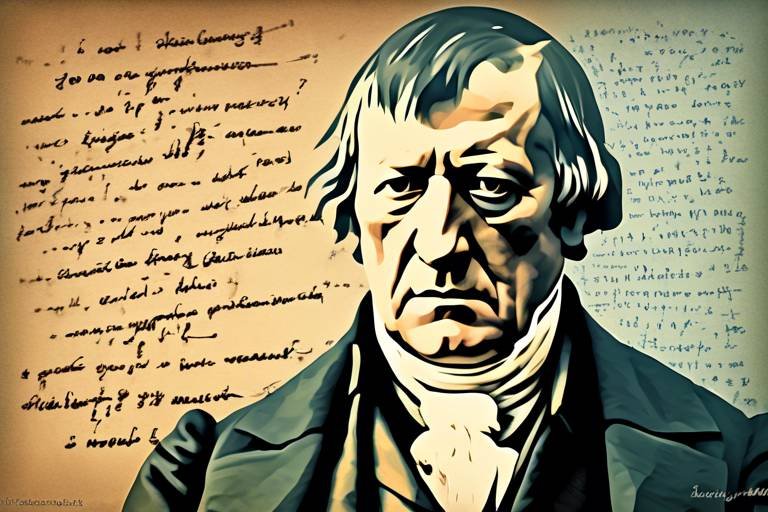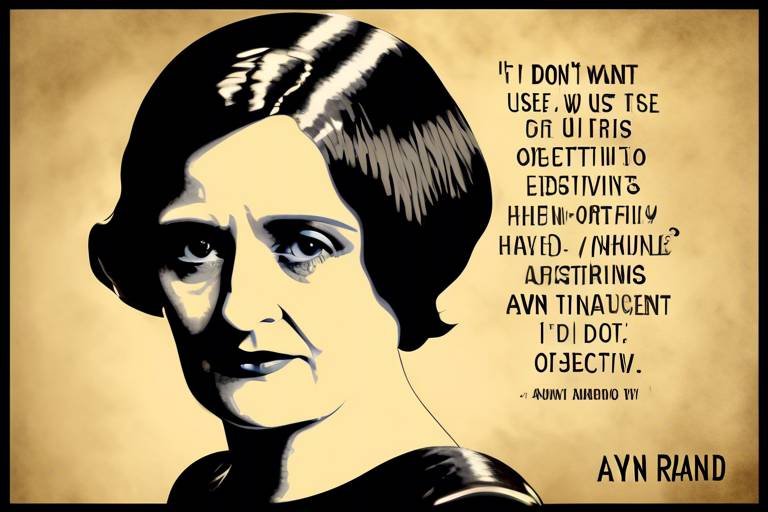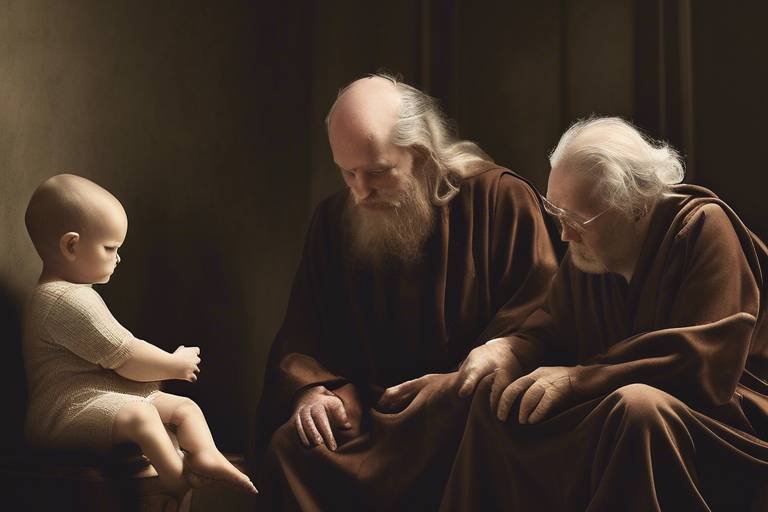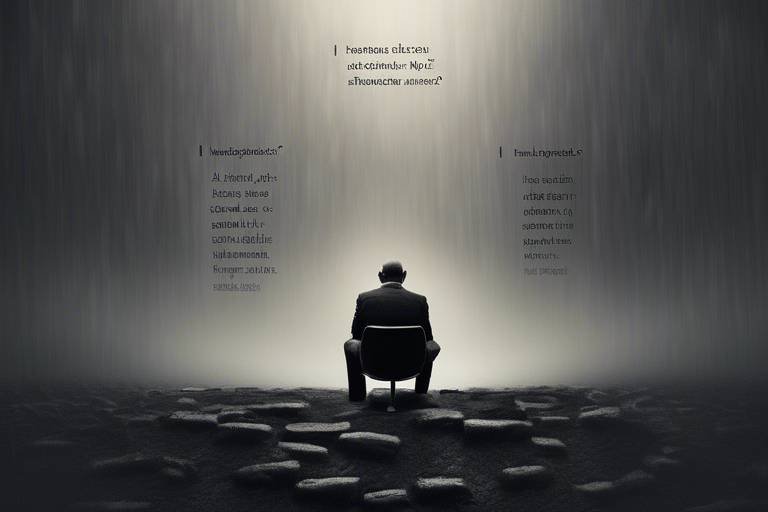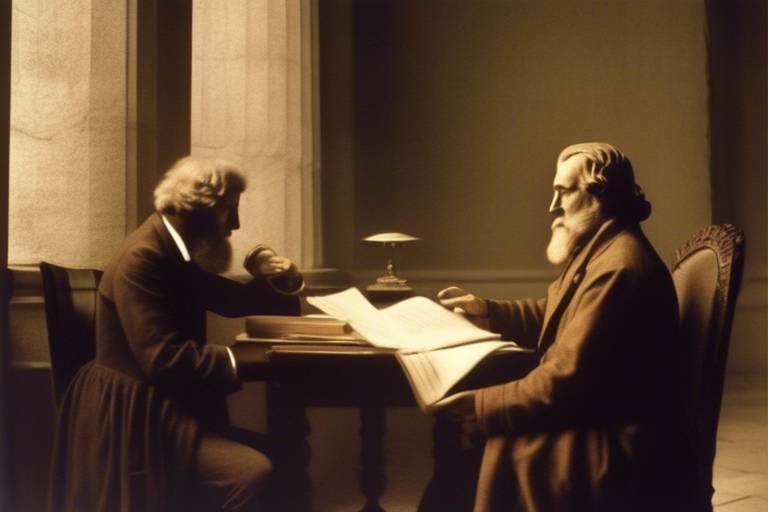Hegel's Absolute Idealism - A Modern Perspective
Hegel's Absolute Idealism is one of those philosophical concepts that can make your head spin. It's like diving into a deep ocean of thought where every wave brings new ideas and interpretations. But don't worry; we’re here to navigate these waters together! This article will explore not just what Hegel meant by Absolute Idealism, but also how it fits into our modern philosophical landscape. Think of it as peeling back the layers of an onion—each layer reveals something new, and sometimes, it might even bring a tear to your eye as you ponder the depth of existence.
Now, why should we care about Hegel in today's world? Well, the truth is, Hegel's ideas resonate in many contemporary discussions, from politics to art to our understanding of consciousness itself. His intricate web of thoughts challenges us to think critically about reality and our place within it. So, whether you're a seasoned philosopher or just curious about the big questions in life, Hegel's Absolute Idealism offers a treasure trove of insights that remain relevant.
As we embark on this philosophical journey, we'll delve into the historical context that shaped Hegel's thoughts, break down the key concepts of his Absolute Idealism, and even tackle some of the critiques that have emerged over time. By the end of this exploration, you’ll not only understand what Hegel was getting at but also appreciate how his ideas continue to influence and provoke thought in our modern age.
So, grab your intellectual surfboard—let's ride the waves of Hegelian thought and see where it takes us!
Understanding the historical backdrop of Hegel's thought is crucial for grasping his Absolute Idealism. Born in 1770 in Stuttgart, Germany, Hegel was deeply influenced by the tumultuous socio-political climate of his time, particularly the aftermath of the French Revolution. This period was marked by a profound questioning of authority and tradition, which set the stage for the emergence of German Idealism. Think of it as a philosophical revolution, where thinkers like Kant and Fichte paved the way for Hegel to develop his ideas.
In this vibrant intellectual atmosphere, Hegel was not just a passive observer; he was an active participant. He sought to reconcile the individual with the universal, the subjective with the objective. His philosophy was a response to the Enlightenment's emphasis on reason and the Romantic movement's focus on emotion. Hegel's work represents a synthesis of these ideas, aiming to create a comprehensive framework that could account for the complexities of human experience.
At the heart of Hegel's Absolute Idealism lies a few foundational concepts that are essential for understanding his philosophy. First and foremost is the notion of the Absolute, which Hegel viewed as the ultimate reality encompassing all existence. Unlike a simple deity or a distant force, the Absolute is dynamic and evolving, much like the universe itself. It’s the idea that everything is interconnected and part of a greater whole.
Next, we have the dialectical method. This is where things get really interesting! Hegel's dialectic involves a triadic process: thesis, antithesis, and synthesis. Picture it as a dance where two partners (the thesis and antithesis) engage in a conflict, leading to a new dance move (the synthesis) that incorporates elements from both. This method illustrates how ideas evolve and how our understanding of reality progresses over time.
Finally, we cannot overlook the importance of self-consciousness. For Hegel, self-awareness is not just a personal trait; it’s a crucial element in realizing the Absolute. When we become aware of ourselves, we also recognize our connection to others and the universe. This interconnectedness is vital in Hegel's view, as it shows that our individual consciousness is part of a larger, universal consciousness.
The dialectical method is central to Hegel's philosophy. It’s like a philosophical engine that drives the evolution of ideas and consciousness. By engaging with conflicting ideas, we can reach a more profound understanding of reality. This is not just theoretical; it reflects the real-world dynamics of human thought and society.
In Hegel's dialectic, the thesis represents an initial idea, while the antithesis introduces a contradiction. This dynamic interaction leads to a synthesis, which reconciles the conflict and advances understanding. Imagine a debate where each side presents compelling arguments; through this clash, a more refined perspective emerges, one that incorporates the merits of both positions.
Synthesis is the resolution of the conflict between thesis and antithesis, leading to a higher level of understanding. This process illustrates the evolution of ideas and the unfolding of reality in Hegel's philosophy. It’s like climbing a mountain: each step (or idea) builds upon the last, bringing us closer to a panoramic view of the landscape of thought.
Self-consciousness plays a pivotal role in Hegel’s Absolute Idealism. It’s not just about knowing oneself; it’s about understanding our place in the grand tapestry of existence. When we become self-aware, we realize that our thoughts and actions are interconnected with the universe. This realization is vital for grasping the concept of the Absolute, as it highlights the unity between individual and universal consciousness.
Despite its profound insights, Hegel's Absolute Idealism has faced significant criticism. Some argue that his philosophy is too abstract, lacking grounding in observable reality. This section reviews major critiques from philosophers and schools of thought, highlighting the limitations and challenges posed to Hegel's ideas.
Empirical critiques argue that Hegel's philosophy lacks grounding in observable reality. Critics from the empiricist camp challenge the validity of Hegel's abstract concepts, suggesting that they are too removed from the tangible world. They often ask: how can we trust a philosophy that seems to float in the clouds of abstraction?
Postmodern thinkers often reject Hegel's ideas as overly systematic and totalizing. They argue that the notion of a singular Absolute is limiting, emphasizing instead plurality and fragmentation in understanding reality. In a world where multiple perspectives coexist, Hegel's grand narrative seems less relevant. However, this critique opens up a dialogue about the nature of reality itself—are we all just pieces of a larger puzzle, or do we create our own unique pictures?
- What is Hegel's Absolute Idealism? Hegel's Absolute Idealism posits that reality is a manifestation of a universal consciousness, where individual thoughts are interconnected with the Absolute.
- How does the dialectical method work? The dialectical method involves a process of thesis, antithesis, and synthesis, where conflicting ideas lead to a higher understanding.
- What are the main critiques of Hegel's philosophy? Major critiques include its abstract nature and the challenge posed by empiricists and postmodern thinkers who emphasize plurality.

The Historical Context of Hegel's Philosophy
To truly grasp Hegel's Absolute Idealism, it's essential to step back and examine the rich tapestry of history that shaped his thoughts. Hegel lived during a period marked by profound transformation—both philosophically and politically. The early 19th century was a time when ideas were not just abstract concepts but were deeply intertwined with the fabric of society. The aftermath of the French Revolution, the rise of nationalism, and the burgeoning industrial revolution created a backdrop that was ripe for philosophical inquiry.
German Idealism, which laid the groundwork for Hegel's thinking, was influenced by earlier philosophers such as Kant and Fichte. Immanuel Kant's critical philosophy, particularly his ideas about the limits of human understanding and the role of the mind in shaping experience, set the stage for Hegel's further explorations. While Kant argued for the necessity of a priori concepts, Hegel took this further, asserting that reality itself was a dynamic process shaped by the unfolding of the Absolute.
Moreover, Hegel was deeply affected by the socio-political environment of his time. The Napoleonic Wars and the subsequent upheaval in Europe played a significant role in shaping his ideas about freedom, history, and the development of self-consciousness. Hegel viewed history as a rational process, where the unfolding of events led humanity toward greater freedom and self-awareness. In this sense, he saw history not as a series of random occurrences but as a dialectical process that reflected the evolution of human thought and society.
In addition, the Enlightenment had instilled a sense of optimism about human reason and progress. Hegel's philosophy can be seen as a continuation of this trajectory, albeit with a twist. While Enlightenment thinkers celebrated individual autonomy, Hegel emphasized the importance of the collective and the interdependence of individuals within the larger context of society. This perspective was revolutionary, challenging the notion of isolated selfhood and highlighting the interconnectedness of human experience.
As we delve deeper into Hegel's work, it's vital to recognize how these historical currents influenced his ideas. The interplay between idealism and empiricism, the tension between individual freedom and collective identity, and the overarching narrative of progress all find their way into Hegel's philosophy. Understanding this context not only enriches our comprehension of Hegelian thought but also illuminates its relevance in contemporary discussions about identity, freedom, and the nature of reality.
In summary, the historical context of Hegel's philosophy is a complex interplay of ideas and events that shaped his understanding of the world. From the influence of German Idealism to the socio-political upheavals of his time, Hegel's thought emerged as a response to the challenges and questions posed by his era. This rich background provides a foundation for exploring the key concepts of his Absolute Idealism, which we will delve into next.
- What is Hegel's Absolute Idealism? - Hegel's Absolute Idealism is a philosophical framework that posits reality as a manifestation of an absolute spirit or consciousness, emphasizing the interconnectedness of all things.
- How did historical events influence Hegel's philosophy? - Hegel was deeply influenced by the socio-political changes of his time, particularly the French Revolution and the rise of nationalism, which shaped his ideas about freedom and history.
- What role does self-consciousness play in Hegel's thought? - Self-consciousness is crucial in Hegel's philosophy as it allows individuals to realize their connection to the Absolute and the broader context of human experience.

Key Concepts of Absolute Idealism
At the heart of Hegel's Absolute Idealism lies a rich tapestry of ideas that challenge our understanding of reality. One might wonder, what exactly is this "Absolute" that Hegel speaks of? In simple terms, the Absolute represents the ultimate reality, an all-encompassing totality that integrates all contradictions and differences. Hegel believed that reality is not merely a collection of isolated objects but a dynamic interplay of relationships that unfolds through history. This idea can be likened to a grand symphony, where each note contributes to the overall harmony, making it essential to appreciate the collective rather than just the individual parts.
Another cornerstone of Hegel's philosophy is the dialectical method. This method is not just a tool for argumentation; it's a way of understanding how ideas evolve. Hegel's dialectic operates on the triadic structure of thesis, antithesis, and synthesis. Picture this: the thesis is like a seed planted in the soil of thought, which then encounters the antithesis, a storm that challenges its existence. This clash leads to a synthesis, a new, more robust idea that emerges from the struggle. This process is ongoing and reflects the continuous development of consciousness and reality itself.
The dialectical method is central to Hegel's philosophy. It serves as a framework for understanding how ideas develop over time. When we think about the world around us, we often see conflicting views and perspectives. Hegel suggests that these contradictions are not merely obstacles but essential components of growth. By engaging with opposing ideas, we can reach a higher understanding of truth. This process is akin to climbing a mountain; each step up reveals a broader view, allowing us to see how various elements of thought interconnect.
In Hegel's dialectic, the thesis represents an initial idea, while the antithesis introduces a contradiction. Imagine a debate where one side presents a compelling argument (the thesis), and the other side counters it with equally valid points (the antithesis). This dynamic interaction is crucial for intellectual progress. Rather than viewing these two sides as opponents, Hegel encourages us to see them as partners in a dance of thought, where each step leads to a deeper understanding.
The culmination of this dialectical process is the synthesis. It is the resolution of the conflict between thesis and antithesis, leading to a higher level of understanding. Think of it as a puzzle; when you fit the pieces together, you create a complete picture that reveals insights not visible in the individual pieces. This synthesis illustrates the evolution of ideas and the unfolding of reality in Hegel's philosophy. It shows us that understanding is not static but a living, breathing entity that evolves as we engage with it.
Self-consciousness plays a pivotal role in Hegel’s Absolute Idealism. It's not just about being aware of oneself; it’s about recognizing one’s place within the vast tapestry of existence. Hegel argues that self-awareness contributes to the realization of the Absolute, the interconnectedness of individual and universal consciousness. Picture a spider weaving its web; each thread represents an individual consciousness, yet all threads are part of a larger structure. This interconnectedness highlights how personal experiences contribute to a shared reality, emphasizing that our understanding of the world is shaped by both individual and collective consciousness.

The Dialectical Method
The dialectical method is not just a mere tool in Hegel's philosophy; it is the very engine that drives the evolution of thought and reality. Imagine a dance, where each step taken by one partner (the thesis) is met with a counter-step from the other (the antithesis). This dynamic interaction creates a rhythm that ultimately leads to a new dance altogether (the synthesis). In this way, Hegel's dialectical method illustrates how contradictions are not merely obstacles but rather essential components of progress. Through this lens, reality is not static; it is a living, breathing entity that evolves through conflict and resolution.
At its core, the dialectical method operates on a triadic structure: thesis, antithesis, and synthesis. To break it down:
- Thesis: Represents an initial proposition or idea.
- Antithesis: Introduces a contradiction or opposing idea.
- Synthesis: Resolves the conflict between the thesis and antithesis, leading to a new understanding.
This process is akin to a conversation where ideas challenge each other, fostering a deeper comprehension of the subject at hand. Just like in a debate, where opposing viewpoints clash, Hegel suggests that this clash is crucial for the advancement of thought. The tension between the thesis and antithesis is not something to be avoided; rather, it is the catalyst for the synthesis that propels understanding forward.
Furthermore, the dialectical method is not confined to abstract thought; it has practical implications in various fields, including politics, ethics, and even art. For instance, in the realm of politics, the dialectical method can be seen in the evolution of ideologies. Consider how a political movement (thesis) may face opposition from a counter-movement (antithesis), leading to a new political framework (synthesis) that incorporates elements from both sides. This ongoing process mirrors the way societies evolve, reflecting the continuous interplay of conflicting ideas.
In Hegel's view, this dialectical process is reflective of the unfolding of the Absolute, where reality is understood as an interconnected whole. Each synthesis achieved does not mark the end of the journey; instead, it becomes a new thesis, ready to engage with its own antithesis, leading to further synthesis. This perpetual cycle of development emphasizes that knowledge and reality are never final; they are always in the making.
In conclusion, the dialectical method is a profound framework that enables us to understand the complex nature of reality and consciousness. It encourages us to embrace contradictions as a vital part of our quest for knowledge, reminding us that from conflict arises clarity, and from confusion, understanding. So, the next time you encounter opposing ideas, remember that they might just be the key to unlocking a deeper truth.
- What is the dialectical method? The dialectical method is a philosophical approach that emphasizes the resolution of contradictions through a process involving thesis, antithesis, and synthesis.
- How does Hegel's dialectical method apply to real-life situations? It can be seen in various contexts, such as political movements or social changes, where conflicting ideas lead to new understandings and frameworks.
- Why is the dialectical method significant? It highlights the importance of conflict and resolution in the evolution of thought, suggesting that knowledge is always a work in progress.

Thesis and Antithesis
In the realm of Hegel's dialectical method, the concepts of thesis and antithesis are foundational. Think of the thesis as the starting point of a conversation, the initial idea that sets the stage for further exploration. For instance, if we consider the thesis to be the notion of freedom as an absolute ideal, it represents a clear, defined position that stands alone in its assertion. However, like any good debate, this idea cannot exist in a vacuum. Enter the antithesis, which introduces a critical perspective or contradiction to the thesis. In our example, the antithesis might argue that freedom is not absolute and is instead constrained by societal norms and responsibilities.
This dynamic interaction between thesis and antithesis is not merely a clash of ideas; it is a transformative process that drives understanding forward. Hegel believed that through this conflict, a synthesis emerges, creating a new, higher level of understanding. This is where the magic happens! The synthesis reconciles the opposing views, integrating elements of both the thesis and antithesis into a more comprehensive perspective. In essence, it’s a bit like a dance where two partners—each with their own rhythm—come together to create a beautiful, harmonious performance.
To illustrate this further, let’s consider a simple table that summarizes the relationship between thesis, antithesis, and synthesis:
| Concept | Description |
|---|---|
| Thesis | The initial idea or proposition. |
| Antithesis | The contradiction or opposing idea. |
| Synthesis | The resolution that reconciles thesis and antithesis. |
In the grand tapestry of Hegelian thought, this triadic structure—thesis, antithesis, and synthesis—serves as a powerful tool for understanding the evolution of ideas and the unfolding of reality. It emphasizes that progress is not linear; rather, it is a winding path filled with contradictions and resolutions. Each synthesis becomes a new thesis, leading to further antitheses and syntheses, thus creating an endless cycle of development. This dynamic process mirrors the complexities of life itself, where growth often comes from grappling with conflicting ideas and perspectives.
So, next time you encounter a challenging idea, remember that it’s not just about winning an argument. It’s about engaging in a dialogue that can lead to deeper insights and a more nuanced understanding of reality. Just as in Hegel's dialectic, every conflict holds the potential for growth and transformation.

Synthesis in Hegelian Thought
In Hegelian philosophy, synthesis serves as a crucial mechanism that facilitates the evolution of ideas and the unfolding of reality. Think of it as a dance between opposing forces: the thesis and the antithesis. When these two forces clash, they create a tension that cannot remain unresolved. This is where synthesis steps in, acting as the mediator that reconciles the conflict and propels us toward a higher understanding. It’s like a potter shaping clay; through the friction and pressure of the wheel, a beautiful form emerges.
To grasp the significance of synthesis, we must recognize its role in the dialectical process. The journey begins with an initial idea, the thesis, which represents a particular viewpoint or understanding of reality. However, as we engage with this idea, contradictions arise, leading to the antithesis. This is not merely a disagreement but an essential part of the process that highlights the limitations of the thesis. The interaction between these two elements is dynamic and transformative, paving the way for synthesis.
Synthesis, therefore, is not just a simple compromise; it is a profound advancement that integrates the insights of both the thesis and antithesis. It transcends the initial conflict and emerges as a new idea that incorporates the strengths of both sides while overcoming their weaknesses. This process can be illustrated in various fields, such as science, art, and even personal growth. For instance, in scientific inquiry, a theory (thesis) may encounter anomalies (antithesis) that challenge its validity, leading to a new theory that better explains the observed phenomena (synthesis).
In the realm of consciousness, synthesis represents the evolution of the self. As individuals navigate through experiences, they encounter contradictions that force them to reevaluate their understanding of themselves and the world around them. This self-reflective process is vital for achieving a more comprehensive awareness of the Absolute, where individual and universal consciousness coalesce. Ultimately, synthesis in Hegelian thought exemplifies the idea that progress arises from conflict and resolution, highlighting the intricate web of interconnectedness that defines our reality.
To better illustrate the concept of synthesis, consider the following table that summarizes the dialectical process:
| Stage | Description |
|---|---|
| Thesis | The initial idea or proposition that presents a certain perspective. |
| Antithesis | The contradiction that challenges the thesis, revealing its limitations. |
| Synthesis | The resolution that reconciles the thesis and antithesis, leading to a new understanding. |
In conclusion, synthesis in Hegelian thought is a powerful concept that underscores the dynamic nature of reality and consciousness. By embracing the conflicts between opposing ideas, we open ourselves to a richer, more nuanced understanding of the world. Just as a symphony is composed of diverse notes that create harmony, our journey through synthesis leads us to a greater realization of the interconnectedness of all things.
- What is the main idea of synthesis in Hegelian thought?
Synthesis is the resolution of conflict between thesis and antithesis, leading to a higher understanding of reality.
- How does synthesis apply to personal growth?
In personal growth, synthesis occurs when individuals confront contradictions in their beliefs, leading to a more comprehensive self-awareness.
- Why is synthesis important in Hegel's philosophy?
Synthesis is crucial as it illustrates the evolution of ideas and the unfolding of reality, emphasizing the interconnectedness of all concepts.

Self-Consciousness and Reality
Self-consciousness is not just a fleeting thought; it's a profound aspect of Hegel's Absolute Idealism that connects the individual to the universe in a dynamic dance of understanding. Imagine standing in front of a mirror, not just seeing your reflection but realizing that the person looking back at you is both a unique individual and a part of a larger whole. This duality is at the heart of Hegel's philosophy. Self-consciousness is the bridge that allows us to recognize our own existence while simultaneously acknowledging our connection to the Absolute, the ultimate reality that encompasses all.
In Hegel's view, self-consciousness is essential for the realization of the Absolute. It’s through our awareness of ourselves that we come to understand the world around us. This process is not merely introspective; it involves a relational aspect where the self is defined in opposition to others. Think of it as a dance where each step taken by one partner influences the other. This interplay between individual and universal consciousness creates a richer understanding of reality, as each self-aware being contributes to the unfolding of the Absolute.
Moreover, self-consciousness fosters a sense of freedom and agency. When we become aware of ourselves, we also become aware of our choices and the impact they have on our surroundings. This realization empowers us to engage with reality actively rather than passively accepting it. Hegel argues that through this self-awareness, individuals can achieve a higher level of consciousness, one that recognizes the interconnectedness of all beings. In this way, self-consciousness is not just about the self; it’s about the self in relation to the cosmos.
To illustrate this concept further, consider the following table which outlines the relationship between self-consciousness and the Absolute:
| Aspect | Self-Consciousness | Absolute |
|---|---|---|
| Definition | Awareness of the self | Ultimate reality encompassing all |
| Role | Bridge between the individual and the universal | Final synthesis of all consciousness |
| Impact | Empowers agency and choice | Unfolds through the development of consciousness |
In conclusion, self-consciousness is a vital component of Hegel's Absolute Idealism. It allows individuals to engage meaningfully with their reality while recognizing their place within a larger framework. This understanding not only enriches our personal experiences but also contributes to the collective evolution of consciousness. As we delve deeper into our self-awareness, we uncover layers of meaning that connect us to the Absolute, revealing the intricate tapestry of existence that binds us all together.
- What is self-consciousness in Hegel's philosophy? Self-consciousness refers to the awareness of oneself as an individual and as part of a larger reality, which is crucial for understanding the Absolute.
- How does self-consciousness relate to the Absolute? Self-consciousness allows individuals to recognize their connection to the Absolute, facilitating a deeper understanding of reality.
- Why is self-consciousness important for agency? Through self-awareness, individuals realize their choices and their impact on the world, leading to a sense of empowerment.

Critiques of Hegel's Absolute Idealism
Hegel's Absolute Idealism, while groundbreaking, has not escaped the critical eye of philosophers and scholars. Many have raised substantial questions regarding its validity and applicability in understanding reality. One of the primary critiques stems from the empirical standpoint, which argues that Hegel's abstract concepts often lack grounding in observable reality. Empiricists, who emphasize knowledge derived from sensory experience, contend that Hegel's philosophy is overly reliant on abstract reasoning, making it difficult to connect his ideas with the tangible world.
For instance, critics argue that Hegel's notion of the Absolute, which suggests an all-encompassing reality, is too vague and lacks empirical evidence. They question how one can substantiate such a grand claim when it seems to exist beyond the realm of human experience. This brings us to a fundamental question: if we cannot observe the Absolute, how can we claim to understand it? This skepticism leads to a broader critique of Hegel's dialectical method, which some view as overly systematic and rigid.
Moreover, postmodern thinkers have taken a different approach in their critique of Hegel's Absolute Idealism. They often reject the idea of a singular Absolute, arguing instead for a more fragmented and pluralistic understanding of reality. In their view, Hegel's philosophy attempts to impose a totalizing framework that oversimplifies the complexities of human experience. This critique resonates with many contemporary thinkers who emphasize the importance of diversity and multiplicity in philosophical discourse.
To illustrate the contrasting perspectives, consider the following table that summarizes key critiques:
| Critique Type | Key Arguments |
|---|---|
| Empirical Critiques | Lack of grounding in observable reality; abstract concepts are difficult to apply to real-world situations. |
| Postmodern Perspectives | Rejection of a singular Absolute; emphasis on plurality and fragmentation; critique of systematic approaches. |
These critiques highlight significant limitations in Hegel's philosophy. For instance, while Hegel's dialectical method seeks to reconcile contradictions, critics argue that it can sometimes lead to oversimplifications. By forcing complex realities into a structured framework, one risks losing the rich nuances that characterize human experience. This is particularly relevant in today's world, where diversity of thought and experience is more apparent than ever.
In conclusion, while Hegel's Absolute Idealism offers a profound framework for understanding consciousness and reality, it is essential to engage with the critiques it faces. By doing so, we can foster a more nuanced and comprehensive approach to philosophy—one that embraces both the depth of Hegel's insights and the richness of the critiques that challenge them.
- What is Hegel's Absolute Idealism? Hegel's Absolute Idealism is a philosophical framework that posits reality is fundamentally shaped by the mind and consciousness, emphasizing the interconnectedness of all things.
- What are the main critiques of Hegel's philosophy? The main critiques include empirical challenges regarding the lack of observable evidence for his concepts and postmodern critiques that emphasize plurality over a singular Absolute.
- How does the dialectical method work in Hegel's philosophy? The dialectical method involves the interaction of thesis, antithesis, and synthesis, where contradictions lead to a higher understanding and the evolution of ideas.

Empirical Critiques
When diving into the murky waters of Hegel's Absolute Idealism, one can't ignore the waves of criticism that have surged from the empirical camp. These critiques fundamentally challenge the validity of Hegel's abstract concepts, arguing that they lack a solid grounding in observable reality. Imagine trying to build a house on sand; that's how empirical critics view Hegel’s philosophical constructs. They contend that his ideas, while intellectually stimulating, often float in the realm of the theoretical, detached from the tangible world we inhabit.
Empiricists, such as David Hume and later philosophers like John Stuart Mill, emphasize the importance of sensory experience and observation as the foundation of knowledge. They argue that Hegel's reliance on abstract reasoning and dialectical processes leads to conclusions that are not only speculative but also disconnected from empirical verification. For instance, consider Hegel’s notion of the Absolute—a concept that embodies the totality of reality. Critics argue that this lofty idea is elusive and cannot be measured or observed in any concrete sense. How can one claim to understand the Absolute when it slips through the fingers like water?
Moreover, the dialectical method, which is central to Hegel's philosophy, is seen by empirical thinkers as overly complex and convoluted. They suggest that the process of thesis, antithesis, and synthesis, while elegant in theory, does not hold up when subjected to empirical scrutiny. Critics argue that the synthesis often appears more like a rhetorical flourish than a genuine advancement in understanding. To illustrate this point, consider a simple example:
| Dialectical Process | Empirical Perspective |
|---|---|
| Thesis: Freedom is essential for development. | Freedom needs to be observed in action, not just theorized. |
| Antithesis: Restrictions can lead to innovation. | Innovation must be measured through real-world outcomes. |
| Synthesis: Freedom and restrictions can coexist. | Coexistence needs empirical evidence to be validated. |
In this table, we see how the dialectical method can create a narrative that may seem profound but lacks empirical backing. The critics argue that without observable evidence, such philosophical musings remain abstract and speculative. This brings us to a crucial question: Can a philosophy that doesn't engage with the real world truly claim to explain it? This is a challenge that Hegel's Absolute Idealism must confront.
Furthermore, empirical critiques often highlight the limitations of Hegel's grand narrative. They point out that by striving for a singular, all-encompassing Absolute, Hegel overlooks the complexities and nuances of reality. This perspective aligns closely with the views of later philosophers who advocate for pluralism and diversity in understanding the world. In a sense, the empirical critique serves as a reminder that while Hegel's ideas may provide a grand vision, they risk oversimplifying the rich tapestry of human experience.
In summary, while Hegel's Absolute Idealism offers a fascinating lens through which to view reality, empirical critiques remind us that philosophy must be tethered to the observable world. The challenge lies in balancing abstract thought with the concrete experiences that shape our understanding. After all, isn't philosophy meant to illuminate our reality rather than obscure it with lofty ideals?
- What is Hegel's Absolute Idealism? Hegel's Absolute Idealism posits that reality is fundamentally shaped by the mind and that the Absolute represents the totality of existence.
- How does the dialectical method work? The dialectical method involves the interaction of thesis, antithesis, and synthesis to develop ideas and advance understanding.
- Why do empiricists critique Hegel's philosophy? Empiricists argue that Hegel's abstract concepts lack grounding in observable reality and that his ideas are often speculative.
- What is the significance of self-consciousness in Hegel's thought? Self-consciousness is crucial as it connects individual awareness to the broader understanding of the Absolute, illustrating the interplay between personal and universal consciousness.

Postmodern Perspectives
Postmodern thinkers often cast a critical eye on Hegel's Absolute Idealism, viewing it as a grand narrative that attempts to explain reality in a singular, systematic way. They argue that Hegel's philosophy, while profound, is overly ambitious in its quest to encapsulate the entirety of human experience within a unified framework. In a world characterized by diversity and complexity, the postmodern critique emphasizes that reality cannot be confined to a single narrative or understanding. Instead, it is a tapestry woven from myriad threads of individual experiences, cultural contexts, and historical contingencies.
One of the central tenets of postmodern thought is the rejection of the idea of a singular Absolute. Instead of a unified truth, postmodernists argue for the existence of multiple truths, each shaped by different perspectives and contexts. This plurality challenges Hegel's assertion that contradictions can be synthesized into a higher understanding. Postmodernists might ask, "Why must we seek a synthesis when the conflict itself can reveal valuable insights?" This perspective opens the door to a more fragmented, yet richer, understanding of reality.
Moreover, postmodern critiques highlight the limitations of Hegel's dialectical method. While Hegel's dialectic seeks to resolve contradictions through synthesis, postmodern thinkers suggest that such resolutions can often oversimplify complex issues. They argue that embracing contradictions might lead to a more nuanced appreciation of reality. For instance, consider the following points:
- Multiplicity of Perspectives: Reality is shaped by various viewpoints, each offering a unique interpretation.
- Contextual Understanding: Knowledge is contingent upon historical and cultural contexts, making it fluid rather than fixed.
- Emphasis on Fragmentation: Rather than seeking cohesion, embracing fragmentation allows for a deeper exploration of the complexities of existence.
In essence, the postmodern critique serves as a reminder that Hegel's grand vision, while intellectually stimulating, may overlook the richness that lies in the chaos of human experience. By challenging the notion of a singular Absolute, postmodern thinkers encourage us to embrace the complexities and contradictions inherent in our understanding of reality. This shift in perspective not only enriches our philosophical discourse but also reflects the dynamic nature of contemporary thought.
1. What is Hegel's Absolute Idealism?
Hegel's Absolute Idealism is a philosophical framework that posits that reality is fundamentally shaped by ideas and consciousness. It suggests that the ultimate reality, or the Absolute, is a synthesis of all individual experiences and thoughts.
2. How does postmodernism critique Hegel's philosophy?
Postmodernism critiques Hegel's philosophy by rejecting the idea of a singular Absolute and emphasizing the plurality of truths. It argues that reality cannot be fully understood through a systematic approach that aims to synthesize contradictions.
3. Why is the dialectical method important in Hegel's thought?
The dialectical method is crucial in Hegel's thought as it illustrates the process of development through thesis, antithesis, and synthesis. This method shows how ideas evolve and how contradictions can lead to higher understanding.
4. What does self-consciousness mean in Hegel's philosophy?
In Hegel's philosophy, self-consciousness refers to the awareness of oneself as an individual and as part of a larger reality. It plays a key role in realizing the Absolute and understanding the interconnectedness of all consciousness.
Frequently Asked Questions
- What is Hegel's Absolute Idealism?
Hegel's Absolute Idealism is a philosophical framework that posits that reality is fundamentally shaped by ideas and consciousness. It emphasizes that the ultimate reality, or the Absolute, is a synthesis of all experiences and knowledge, evolving through a dialectical process.
- How does the dialectical method work in Hegel's philosophy?
The dialectical method involves a triadic structure: thesis, antithesis, and synthesis. The thesis represents an initial idea, the antithesis introduces a conflicting idea, and the synthesis reconciles these contradictions, leading to a higher understanding. This dynamic process illustrates how ideas evolve over time.
- Why is self-consciousness important in Hegel's Absolute Idealism?
Self-consciousness is crucial because it allows individuals to recognize their place within the larger framework of reality. It connects personal awareness with universal consciousness, enabling the realization of the Absolute. This interplay highlights the relationship between individual experiences and the collective understanding of existence.
- What are some major critiques of Hegel's Absolute Idealism?
Critiques often focus on Hegel's abstract concepts, which some argue lack empirical grounding. Empiricists challenge the applicability of his ideas to observable reality, while postmodern thinkers reject the notion of a singular Absolute, advocating for a more fragmented and pluralistic understanding of reality.
- How has Hegel's philosophy influenced contemporary thought?
Hegel's philosophy has significantly influenced various fields, including political theory, existentialism, and critical theory. His ideas on dialectics and self-consciousness have shaped discussions around identity, history, and the development of ideas, making his work relevant in modern philosophical discourse.

